|
|
|
Sort Order |
|
|
|
Items / Page
|
|
|
|
|
|
|
| Srl | Item |
| 1 |
ID:
132479
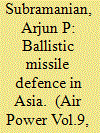

|
|
|
|
|
| Publication |
2014.
|
| Summary/Abstract |
The one continent where ballistic missiles have proliferated tremendously is Asia. There are some important factors that have been, and are, contributing to such a trend in the region. Firstly, the demand for the ballistic missile as it is a relatively cheap weapon to develop and deploy compared to a large and sophisticated air force. Also, this weapon is hard to counter even by the most technologically advanced countries. Secondly, the existing geo- political make-up where confrontation is between states that are at opposite poles of the power spectrum, where the weaker side finds such weapons most suitable to counter a technologically superior adversary. Thirdly, the ready availability of the technology and vital components through both legal and clandestine means. These factors have enabled states like North
Korea with a less than meagre technology base to adapt the technology, of course, with tremendous assistance, to develop ballistic missile capability. With the rapid proliferation of these weapons in Asia, countries facing this threat have been looking for ways to counter it. Most have turned to some level of Ballistic Missile Defence (BMD). This paper attempts to study the ballistic missile threat and the missile defence efforts of the US and its allies in East Asia, China, Israel and India.
|
|
|
|
|
|
|
|
|
|
|
|
|
|
|
|
| 2 |
ID:
110770


|
|
|
|
|
| Publication |
2011.
|
| Summary/Abstract |
This article assesses the extent to which security regimes are the products of authorization in the thought of Thomas Hobbes and Carl Schmitt. The Hobbesian security regime offers a contingent construction of security in terms of processes of authorization and brings into view questions about the epistemic construction of security within security discourse today. The Schmittian concept of security involves the naturalization of security through the state, meaning that security is understood as condition rather than regime. Rather than look to Carl Schmitt's concept of security as the paradigm of international security today, there are clear benefits in returning to the contractual account of security evident in the Hobbesian emphasis on authorization. Security is not the primary value of political community, but the means by which political communities realize their internal goods. Schmitt's security regime is fictive, driven by colourful metaphor and political theology. By returning to classic questions of authorization-how a security regime authorizes itself-International Relations theory can examine the legitimation of security beyond an exclusively state-centric model.
|
|
|
|
|
|
|
|
|
|
|
|
|
|
|
|
| 3 |
ID:
133090
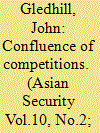

|
|
|
|
|
| Publication |
2014.
|
| Summary/Abstract |
In April 2006, riots broke out on the streets of Dili. As violence escalated over the weeks that followed, a beacon of liberal peace-building dissolved into near-anarchy. While there have been several accounts of Timor-Leste's "crisis" of 2006, it remains unclear why violence spiraled at that time, rather than at an earlier point in the country's post-conflict transition. This article addresses that temporal puzzle by combining an analysis of the structural origins of the crisis with discussion of proximate, agency-driven triggers to violence. The resulting narrative first details the development of competition between governing elites, and also between state security actors, over the years following independence. The fusion of those two dynamics of competition in 2006, I then argue, created conditions sufficient for violent conflict.
|
|
|
|
|
|
|
|
|
|
|
|
|
|
|
|
| 4 |
ID:
133094
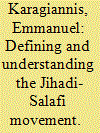

|
|
|
|
|
| Publication |
2014.
|
| Summary/Abstract |
Jihadi-Salafi groups have been on the march in the post-9/11 years on a violent campaign to achieve their ends. From North America to South-East Asia and from Europe to Sub-Saharan Africa, Jihadi-Salafis have attacked Western and local targets with often devastating results. Despite growing attention to the Jihadi-Salafi movement, which includes both globalized and localized components, there are still questions that remain largely unanswered. Three new books can shed light on this modern phenomenon that has preoccupied Western security policies for the past decade. Jihadi-Salafism is a large and diverse movement with a global reach that has embarked on an armed struggle to defend the imagined ummah.
|
|
|
|
|
|
|
|
|
|
|
|
|
|
|
|
| 5 |
ID:
133143
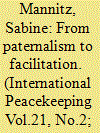

|
|
|
|
|
| Publication |
2014.
|
| Summary/Abstract |
This paper discusses the shortcomings of the established Security Sector Reform (SSR) concept and practice and argues for an overhaul of the ways in which transformations in security spaces are approached. In consideration of the theoretical and practical implications of the quest to involve local actors in SSR, a related research agenda is sketched and a case is made in particular for the inclusion of social anthropological perspectives to foster an empirically grounded evaluation of security governance interactions and transformations in context. This could be relevant to the search for strategies to support longer term facilitation processes and overcome the widespread paternalism in donor-recipient relations.
|
|
|
|
|
|
|
|
|
|
|
|
|
|
|
|
| 6 |
ID:
132339
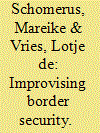

|
|
|
|
|
| Publication |
2014.
|
| Summary/Abstract |
This article compares two cases of securitization along South Sudan's border with the Democratic Republic of the Congo. By comparing how a security concern - the presence of the Lord's Resistance Army - was interpreted and responded to, the article shows that border security practices in two borderscapes are improvised, contradictory and contested, and serve to establish authority rather than actually securing the border. This is apparent on three levels: (a) through the multiplicity of security actors vying for authority; (b) in how they interpret security concerns; and (c) in terms of what practice follows. The article argues that by allowing authority at the border to be taken by actors that are not under direct control of the central government, the South Sudanese state is developing as one that controls parts of the country in absentia, either by granting discretionary powers to low-level government authorities at the border or through tactical neglect. Processes of securitization by both state and non-state actors in the borderland are largely disconnected from the South Sudanese central government, which does not claim authority over this border and thus seemingly does not consider the lack of security for its citizens, and the parallel authorities, as a threat to central stability.
|
|
|
|
|
|
|
|
|
|
|
|
|
|
|
|
| 7 |
ID:
132794
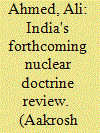

|
|
|
|
|
| Publication |
2014.
|
| Summary/Abstract |
A nuclear doctrine review is on the cards. The BJP having promised in its manifesto that it will conduct a review would likely follow through, in the least to keep up its credibility The last review was done in 2003, when the earlier NDA government adopted the official nuclear doctrine. It is believed that the official, declaratory nuclear doctrine was largely based on the Draft Nuclear Doctrine of I999. While the UPA government that followed did not review (read or revise) the doctrine, this does not imply that it did not keep the doctrine under review. The National Security Advisory Board (NSAB), convened for two years, is tasked to review national security and, as part of this. can be expected to have engaged with nuclear questions. Its output has been kept confidential. Besides, the six monthly meetings of the Executive Council of the Nuclear Command Authority have found mention in the media. Therefore, it will only be fair to acknowledge that a lack of transparency on this score does not imply inaction. It can be inferred from the fact that the declaratory doctrine has not been revised that the UPA government. in both its tenures. either did not think it necessary to revise the doctrine or may have revised the operational nuclear doctrine even while keeping the declaratory nuclear doctrine in place and intact.
|
|
|
|
|
|
|
|
|
|
|
|
|
|
|
|
| 8 |
ID:
133140
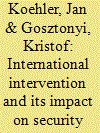

|
|
|
|
|
| Publication |
2014.
|
| Summary/Abstract |
The challenge of building a security sector effective in terms of protecting the population and the state from challengers, and which at the same time fulfils minimum standards of good governance, was a daunting one in Afghanistan. These difficulties were compounded by what in hindsight seem to be obvious mistakes on the part of the intervention. In our paper, we investigate how security sector building fared under such adverse conditions in north-east Afghanistan. We find that in spite of the formidable challenges and the mistakes made by the international intervention, it did not fail completely. Neither did it succeed. Based on the results of quantitative surveys and qualitative research, we suggest that (a) the international intervention was partly successful in building up Afghan National Security Forces - both as a fighting force and in terms of security sector institutions that are restrained to some extent by the rule of law; (b) the problems caused by setting up informal local militias (violent feuds, criminality, human rights abuses and extortion of the population) could be partly mitigated by transforming them into an official local police programme.
|
|
|
|
|
|
|
|
|
|
|
|
|
|
|
|
| 9 |
ID:
156087
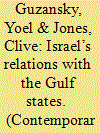

|
|
|
|
|
| Summary/Abstract |
By drawing on the literature about security regimes, this article posits the idea that a particular type of regime, which can be termed a “tacit security regime” (TSR), has begun to emerge between Israel, on the one hand, and several Gulf Arab states, on the other. It is a regime which, unlike liberal institutional variants that attempt to privilege the promotion of collective norms, remains configured around perceptions of threats to be countered and strategic interests to be realized. By examining the development, scope, and scale of this nascent TSR, this article explores the extent to which Israel, mindful of Washington, DC’s regional retrenchment, sees the emergence of such a regime as redefining the political and strategic contours of Israel’s relations with much of the Middle East.
|
|
|
|
|
|
|
|
|
|
|
|
|
|
|
|
| 10 |
ID:
133141
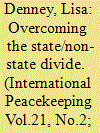

|
|
|
|
|
| Publication |
2014.
|
| Summary/Abstract |
Despite the widely accepted recognition that fragile and conflict-affected countries are characterized by plural security and justice orders, donor-led security and justice programmes continue to engage overwhelmingly with state actors on the basis of liberal peacebuilding models that internalize Weberian understandings of the state. In addition, policies pushing reformers towards engagement with 'informal', 'non-state', or customary systems often do so in a way that suggests a neat separation between the 'state' and 'non-state'. This does not reflect how security and justice operate in practice. This paper uses the case of Sierra Leone to demonstrate the panoply of actors that constitute the plural security and justice context there, and how these actors interact in practice. This reveals the highly interactive nature of the multiple security and justice chains commonly used in Sierra Leone. It is argued that in order to meaningfully engage with the multitudinous ways in which people access security and justice, external reformers need to develop a comprehensive understanding of this complexity. Such an understanding will assist reformers in transcending the increasingly unhelpful state/non-state distinction and in engaging with security and justice from the perspective of the end users, rather than from the perspective of externally derived models.
|
|
|
|
|
|
|
|
|
|
|
|
|
|
|
|
| 11 |
ID:
133137
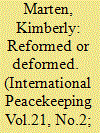

|
|
|
|
|
| Publication |
2014.
|
| Summary/Abstract |
A great deal of international attention and funding was given to reform and training of the Palestinian Authority Security Forces (PASF), starting with the Oslo Accords process in 1993 and accelerating with the advent of Fayyadism and the expulsion of the Palestinian Authority government from Gaza in 2007. Many donors and other supporters in the US, the EU, and Israel claimed this process as a success story, and indeed from 2008-2010 local conditions looked hopeful in the fragile, post-conflict West Bank proto-state. But soon unresolved political conflicts inside the West Bank encouraged patronage-based violence to reemerge within the security forces, and the fractured approach of the international community aggravated the situation. By 2013 reform had stalled. This article explores the history of patronage politics in the PASF and uses the Palestinian example to highlight the tensions inherent in contested visions of security, when international donors define success in terms of anti-terrorism rather than genuine domestic security governance.
|
|
|
|
|
|
|
|
|
|
|
|
|
|
|
|
| 12 |
ID:
080911
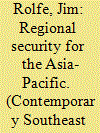

|
|
|
|
|
| Publication |
2008.
|
| Summary/Abstract |
Despite calls over the years for the Asia-Pacific region, or some subset of it, to develop a regional security regime, no deliberate action to achieve this has been taken. This paper considers the possible ends of a regional security regime and the means towards achieving them. The ends themselves would differ according to whether any regime focused on security, traditionally and narrowly conceived, on comprehensive security or on human security. No matter which approach is taken, if the regime is to be successful in any sense beyond that of rhetoric, some of the region's cherished norms such as non-intervention as that is currently interpreted will have to be at least modified, if not completely scrapped. Even if the region collectively decides it needs a security regime and can agree on its ends, there are many alternative ways of achieving the ends and the processes of working out detailed rules will be difficult and time-consuming. None of this is to say that establishing a regional security regime will be impossible. It is to say that it will involve a lot of work, and a lot of compromise by state policy-makers
|
|
|
|
|
|
|
|
|
|
|
|
|
|
|
|
| 13 |
ID:
133138
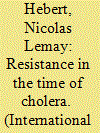

|
|
|
|
|
| Publication |
2014.
|
| Summary/Abstract |
The United Nations Stabilisation Mission in Haiti (MINUSTAH) is the latest of seven UN missions in the country, stretching over 20?years of international involvement. If the UN's Security Sector Reform (SSR) mission has had a 'stabilizing' influence on the country following Aristide's forced exile since 2004, a string of sexual scandals and the cholera scandal has progressively contributed to modify the local perception of the mission, seen as yet another foreign 'occupation' in Haiti. This article argues that while the resistance to the UN in Haiti is clearly contextual - linked to certain events and actions of certain individuals - it is also, and more fundamentally, structural in form. The article explores themes around the local resistance encountered by the UN in Haiti, using James Scott's multi-levelled approach of the landscape of resistance to highlight the complex nature of statebuilding in Haiti, while linking the more recent form of resistance to MINUSTAH to the specific securitization approach adopted by the mission and its restrictive mindset.
|
|
|
|
|
|
|
|
|
|
|
|
|
|
|
|
| 14 |
ID:
133139
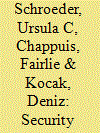

|
|
|
|
|
| Publication |
2014.
|
| Summary/Abstract |
Comprehensive Security Sector Reform (SSR) has become a crucial component of many international peace- and statebuilding operations. The paper assesses the consequences of these attempts to foster international standards of 'democratic security governance' in the security sectors of post-conflict or fragile states. The paper builds on qualitative case study research of SSR interventions in Timor-Leste, Liberia, and the Palestinian Territories, conducted 2010-2012, to trace patterns of adoption, adaptation or rejection of international security governance standards by domestic actors. The article uses insights from sociological organization theories to identify different types of 'hybrid security orders' that result from encounters between international and domestic models of security governance in SSR processes.
|
|
|
|
|
|
|
|
|
|
|
|
|
|
|
|
| 15 |
ID:
160194


|
|
|
|
|
| Publication |
London, Zed Books, 2011.
|
| Description |
vii, 287p.pbk
|
| Standard Number |
9781848135307
|
|
|
|
|
|
|
|
|
|
|
|
Copies: C:1/I:0,R:0,Q:0
Circulation
| Accession# | Call# | Current Location | Status | Policy | Location |
| 059461 | 353.1/PRI 059461 | Main | On Shelf | General | |
|
|
|
|
|
|
|
|
|